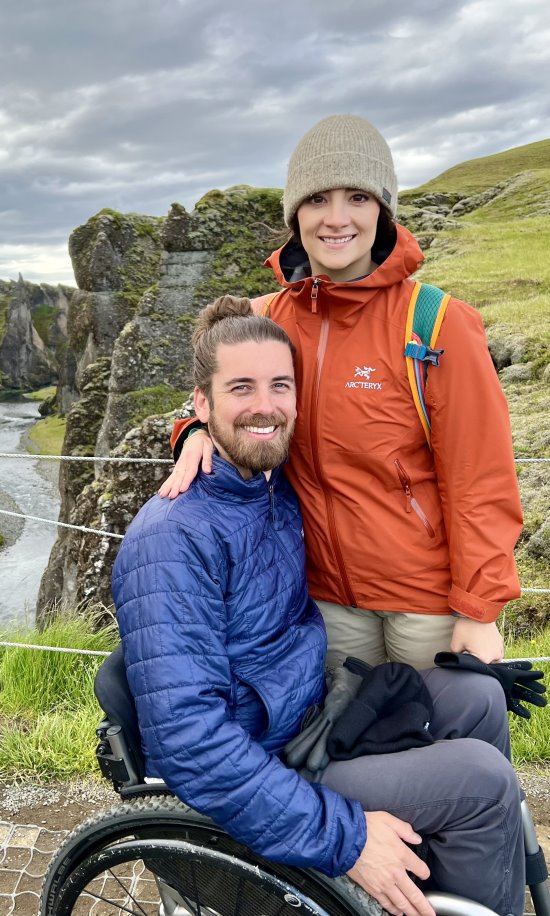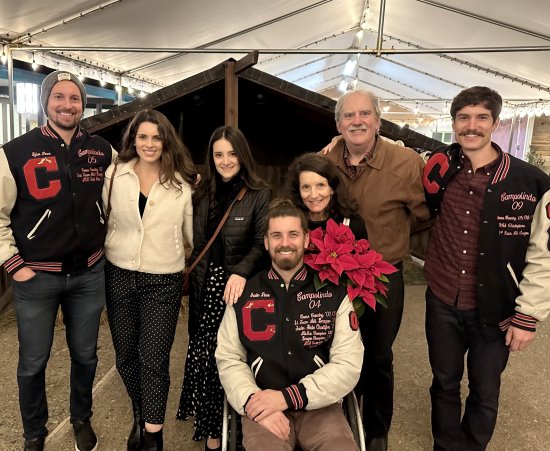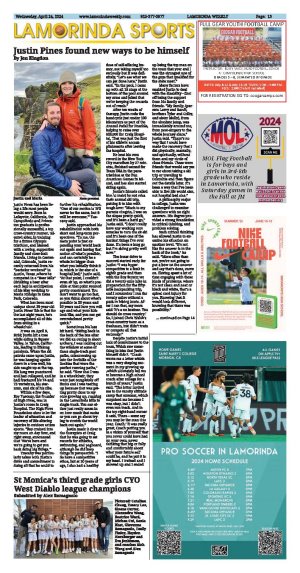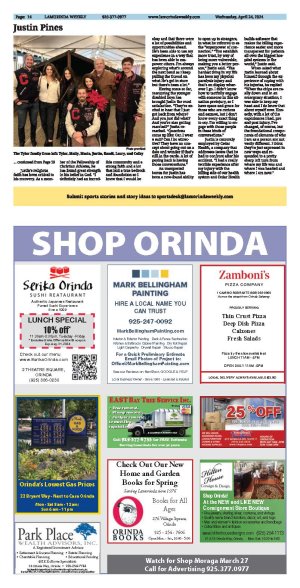| | Published April 24th, 2024
| Justin Pines found new ways to be himself
| | | By Jon Kingdon |  | | Justin and Maria Photo provided |
Justin Pines has been living a life most people would envy. Born in Lafayette, California, the Campolindo and Princeton graduate is professionally successful, a top cross-country runner, talented skier, in training for a future Olympic triathlon, and blessed with a loving, supportive family and close-knit friends. Living in Centennial, Colorado, Justin recently returned from his "bachelor weekend" in Austin, Texas ,where he competed in a "Beer Mile" (drinking a beer after each lap) in anticipation of his May wedding to Maria Hidalgo in Estes Park, Colorado.
 What has been most unique about 38-year-old Justin Pines' life is that for the last eight years, he's accomplished all of this from sitting in a wheelchair.
What has been most unique about 38-year-old Justin Pines' life is that for the last eight years, he's accomplished all of this from sitting in a wheelchair.
 It was on April 9, 2016; Justin hit a tree while skiing in Squaw Valley, in Tahoe, California, leading to lifelong paralysis. When the ski patrols came upon Justin, he was hanging upside down in a tree well, his skis caught up at the top. His lung was punctured and had collapsed, and he had fractured his T4 and T5 vertebrae, his sternum, and six of his ribs.
It was on April 9, 2016; Justin hit a tree while skiing in Squaw Valley, in Tahoe, California, leading to lifelong paralysis. When the ski patrols came upon Justin, he was hanging upside down in a tree well, his skis caught up at the top. His lung was punctured and had collapsed, and he had fractured his T4 and T5 vertebrae, his sternum, and six of his ribs.
 Within a few days, Roy Tuscany, the founder of High Fives, was in Justin's room in Craig Hospital. The High Fives Foundation aims to be the leader of education and recovery of life-altering injuries in outdoor action sports. "Roy cruised into my room on day four, and right away, announced that 'We're here and we're going to get you back doing big things.'"
Within a few days, Roy Tuscany, the founder of High Fives, was in Justin's room in Craig Hospital. The High Fives Foundation aims to be the leader of education and recovery of life-altering injuries in outdoor action sports. "Roy cruised into my room on day four, and right away, announced that 'We're here and we're going to get you back doing big things.'"
 Tuscany was particularly taken with Justin's drive and commitment to doing all that he could to further his rehabilitation. "One of our mottos is 'It'll never be the same, but it will be awesome,'" Tuscany said.
Tuscany was particularly taken with Justin's drive and commitment to doing all that he could to further his rehabilitation. "One of our mottos is 'It'll never be the same, but it will be awesome,'" Tuscany said.
 Justin approached his rehabilitation with both short and long-term perspectives. "To me, the meta point is just expanding your world back out again and having that notion of what's possible, and can certainly be a whole lot bigger than what you initially think it is, which is the size of a hospital bed," Justin said. "At that point, I couldn't even sit up, so what's possible at that point seemed pretty constrained. You don't want to go too fast, so you think about what's possible in 20 years and 50 years and how you will age and what your kids look like, and you can get overwhelmed pretty quick."
Justin approached his rehabilitation with both short and long-term perspectives. "To me, the meta point is just expanding your world back out again and having that notion of what's possible, and can certainly be a whole lot bigger than what you initially think it is, which is the size of a hospital bed," Justin said. "At that point, I couldn't even sit up, so what's possible at that point seemed pretty constrained. You don't want to go too fast, so you think about what's possible in 20 years and 50 years and how you will age and what your kids look like, and you can get overwhelmed pretty quick."
 Sometimes his loss hit hard. "Riding back in the back of the bus after we did an outing to shoot archery, I was looking out the window at some of these single-track goat paths, crisscrossing up into the foothills of the Rockies that were the perfect running paths," he said. "Now that I was in a wheelchair, they were just completely off limits and I was tearing up because that was getting pretty close to my core growing up, running in the Lamorinda hills in single track. You can either just really zoom in on how much that sucks or you can go about trying to stretch the world back out again."
Sometimes his loss hit hard. "Riding back in the back of the bus after we did an outing to shoot archery, I was looking out the window at some of these single-track goat paths, crisscrossing up into the foothills of the Rockies that were the perfect running paths," he said. "Now that I was in a wheelchair, they were just completely off limits and I was tearing up because that was getting pretty close to my core growing up, running in the Lamorinda hills in single track. You can either just really zoom in on how much that sucks or you can go about trying to stretch the world back out again."
 Justin made it clear to the therapists at Craig that he was going to set records for athletics, swimming, and pegboard, although he did keep things in perspective. "I do have a competitive ethos, but at 30 years of age, I also had a healthy dose of self-effacing humor, not taking myself too seriously but it was definitely, "Let's see what we can get done here," Justin said. "In the pool, I came up with all 15 rings at the bottom of the pool around my arms and joked that we're keeping the records out of reach."
Justin made it clear to the therapists at Craig that he was going to set records for athletics, swimming, and pegboard, although he did keep things in perspective. "I do have a competitive ethos, but at 30 years of age, I also had a healthy dose of self-effacing humor, not taking myself too seriously but it was definitely, "Let's see what we can get done here," Justin said. "In the pool, I came up with all 15 rings at the bottom of the pool around my arms and joked that we're keeping the records out of reach."
 After ten weeks of therapy, Justin rode the handcycle just under 100 kilometers as part of the Annual Pedal for Possible, helping to raise over $25,000 for Craig Hospital. That was just the first of his athletic accomplishments after leaving the hospital.
After ten weeks of therapy, Justin rode the handcycle just under 100 kilometers as part of the Annual Pedal for Possible, helping to raise over $25,000 for Craig Hospital. That was just the first of his athletic accomplishments after leaving the hospital.
 He beat his own record in the New York City marathon by 27 minutes, finished second for Team USA in the paratriathlon at the Pan American Games in Miami, and has also started skiing again.
He beat his own record in the New York City marathon by 27 minutes, finished second for Team USA in the paratriathlon at the Pan American Games in Miami, and has also started skiing again.
 Justin's friends called him to insist he not miss their annual ski trip, putting it to him with tough love: "Much to my parents chagrin, I was on the slopes pretty quick, and it's been a hard go," Justin said. "I don't really have any working core muscles to turn the sit-ski and it's been one of the hardest things I've ever done. It's been a long go but I'm skiing pretty well now."
Justin's friends called him to insist he not miss their annual ski trip, putting it to him with tough love: "Much to my parents chagrin, I was on the slopes pretty quick, and it's been a hard go," Justin said. "I don't really have any working core muscles to turn the sit-ski and it's been one of the hardest things I've ever done. It's been a long go but I'm skiing pretty well now."
 The inner drive to succeed started early for Justin: "I was hyper-competitive to a fault in eighth grade and then with the Boy Scouts; we did a twenty-mile hike in preparation for the fifty-mile backpacking trip, and I remember I ran the twenty miles without a pack in hiking boots. After I ran that, my mom said `It's a no brainer. You should do cross country.' So, I joined Chris Walsh's cross-country team as a freshman, but didn't train or compete all that seriously."
The inner drive to succeed started early for Justin: "I was hyper-competitive to a fault in eighth grade and then with the Boy Scouts; we did a twenty-mile hike in preparation for the fifty-mile backpacking trip, and I remember I ran the twenty miles without a pack in hiking boots. After I ran that, my mom said `It's a no brainer. You should do cross country.' So, I joined Chris Walsh's cross-country team as a freshman, but didn't train or compete all that seriously."
 Despite Justin's initial lack of commitment to the team, Walsh saw something in him that Justin himself didn't. "Coach wrote me a letter which was a very shaping moment in my growing up ,which ultimately led me to become a high school coach after college for a bunch of years," Justin said. "The letter invited me to the varsity altitude camp that summer, which surprised me because I was okay, but I didn't even run track. And in the top right-hand corner it said, `Pines - some say you may be the man this year. Coach.' It was really great, Coach putting you in a vision of yourself that you never could have had on your own, never thinking that big or fully and comfortably about what your future self could be, and he put it in my head. I trained and I showed up and I ended up being the top man on the team that year and I was the strongest one of the guys that qualified for the state meet."
Despite Justin's initial lack of commitment to the team, Walsh saw something in him that Justin himself didn't. "Coach wrote me a letter which was a very shaping moment in my growing up ,which ultimately led me to become a high school coach after college for a bunch of years," Justin said. "The letter invited me to the varsity altitude camp that summer, which surprised me because I was okay, but I didn't even run track. And in the top right-hand corner it said, `Pines - some say you may be the man this year. Coach.' It was really great, Coach putting you in a vision of yourself that you never could have had on your own, never thinking that big or fully and comfortably about what your future self could be, and he put it in my head. I trained and I showed up and I ended up being the top man on the team that year and I was the strongest one of the guys that qualified for the state meet."
 Many factors have enabled Justin to deal with the disability - first off being the support from his family and friends. "My family, (parents Larry and Randi, brothers Tyler and Colby, and sister Molly), from the absolute jump, was immediately around me, from post-surgery to the whole journey since," Justin said. "There's no way that I could have made the recovery that I did physically, mentally, and spiritually, without them and my circle of close friends. These were friends that would say yes to me about taking a ski trip or traveling to Colombia and then figure out the details later. It's been a way that I've been able to live life world size, not hospital bed size."
Many factors have enabled Justin to deal with the disability - first off being the support from his family and friends. "My family, (parents Larry and Randi, brothers Tyler and Colby, and sister Molly), from the absolute jump, was immediately around me, from post-surgery to the whole journey since," Justin said. "There's no way that I could have made the recovery that I did physically, mentally, and spiritually, without them and my circle of close friends. These were friends that would say yes to me about taking a ski trip or traveling to Colombia and then figure out the details later. It's been a way that I've been able to live life world size, not hospital bed size."
 A philosophy major in college, Justin was challenged to examine questions with no right answers. His degree provided a strong foundation in critical thinking, and problem solving.
A philosophy major in college, Justin was challenged to examine questions with no right answers. His degree provided a strong foundation in critical thinking, and problem solving.
 Such critical thinking has allowed Justin to examine his situation on another level. "It's not like the answer is in the back of the book," he said. "More often than not, you're not going to put a bow on the answer and say that's done, move on. Having spent a lot of time engaging with those kinds of problems, where it's not clean and neat or black and white, that's a spinal cord injury for you. Knowing that it would look different, knowing that there was possibility."
Such critical thinking has allowed Justin to examine his situation on another level. "It's not like the answer is in the back of the book," he said. "More often than not, you're not going to put a bow on the answer and say that's done, move on. Having spent a lot of time engaging with those kinds of problems, where it's not clean and neat or black and white, that's a spinal cord injury for you. Knowing that it would look different, knowing that there was possibility."
 Justin's religious faith has been critical to his recovery. As a member of the Fellowship of Christian Athletes, he has found great strength in his belief in God. "I definitely had an incredible community and a strong faith and a lot that laid a true bedrock and foundation so I knew that I would be okay and that there were a lot of possibilities and opportunities ahead. He's been able to use my experience in a way that has been able to empower others. I'm always exploring what's around the next bend as I keep pulling the thread on what He's got in store but there's been a lot."
Justin's religious faith has been critical to his recovery. As a member of the Fellowship of Christian Athletes, he has found great strength in his belief in God. "I definitely had an incredible community and a strong faith and a lot that laid a true bedrock and foundation so I knew that I would be okay and that there were a lot of possibilities and opportunities ahead. He's been able to use my experience in a way that has been able to empower others. I'm always exploring what's around the next bend as I keep pulling the thread on what He's got in store but there's been a lot."
 Having come so far, mentoring the younger disabled boys has brought Justin the most satisfaction. "They're excited to hear that I just got back from where? And you just did what? And you're also getting married?" Justin remarked. "Questions come up like: Can I wear a suit? Can I be attractive? They have no concept about going out on a date and wonder if that's still in the cards. A lot of paying back is having those conversations."
Having come so far, mentoring the younger disabled boys has brought Justin the most satisfaction. "They're excited to hear that I just got back from where? And you just did what? And you're also getting married?" Justin remarked. "Questions come up like: Can I wear a suit? Can I be attractive? They have no concept about going out on a date and wonder if that's still in the cards. A lot of paying back is having those conversations."
 An unexpected bonus for Justin has been a new-found ability to open up to strangers, in what he referred to as the "superpower of connection." "You establish more trust, by way of being more vulnerable, making you a better person," Justin said. "The hardest thing in my life has been my physical paralysis injury and that's on display wherever I go. I didn't know how to tactfully engage with someone in this situation preinjury, so I have space and grace for those who are curious and earnest, but I don't know every exact thing to say. I'm willing to engage with those people in these kinds of conversations."
An unexpected bonus for Justin has been a new-found ability to open up to strangers, in what he referred to as the "superpower of connection." "You establish more trust, by way of being more vulnerable, making you a better person," Justin said. "The hardest thing in my life has been my physical paralysis injury and that's on display wherever I go. I didn't know how to tactfully engage with someone in this situation preinjury, so I have space and grace for those who are curious and earnest, but I don't know every exact thing to say. I'm willing to engage with those people in these kinds of conversations."
 Justin is currently employed by Cedar Health, a company that addresses issues that he had to confront after his accident. "I had a really terrible experience after my injury with the billing side of our health system and Cedar Health builds software that makes the billing experience easier and more transparent for patients all over the biggest hospital systems in the world," Justin said.
Justin is currently employed by Cedar Health, a company that addresses issues that he had to confront after his accident. "I had a really terrible experience after my injury with the billing side of our health system and Cedar Health builds software that makes the billing experience easier and more transparent for patients all over the biggest hospital systems in the world," Justin said.
 When asked what Justin learned about himself through the experience of coping with his injuries, he replied "When the chips are really down and in an emergency situation, I was able to keep my head and I do know that about myself now. Honestly, with a lot of the experiences I had, pre and post injury, I've changed, of course, but the foundational components of elements of who I am as a person are not vastly different. I think they're just expressed in new ways and responded to a pretty sharp left turn from where my life was and where I was headed and where I am now."
When asked what Justin learned about himself through the experience of coping with his injuries, he replied "When the chips are really down and in an emergency situation, I was able to keep my head and I do know that about myself now. Honestly, with a lot of the experiences I had, pre and post injury, I've changed, of course, but the foundational components of elements of who I am as a person are not vastly different. I think they're just expressed in new ways and responded to a pretty sharp left turn from where my life was and where I was headed and where I am now." |
 | | The Tyler family from left: Tyler, Molly, Maria, Justin, Randi, Larry, and Colby Photo provided | | | | | | | | | | | |




